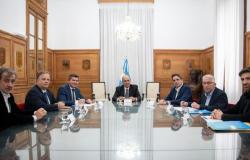The Colombian Federation of Educators (Fecode) has until now been a faithful ally of the Government of Gustavo Petro. Not even the flaws in the new health model for official teachers, implemented on May 1, led to a head-on confrontation. But the modifications to the education reform that the Executive negotiated last week with the opposition have overwhelmed the patience of its more than 300,000 members. The tension is evident. “It was behind our backs, behind closed doors and by assault,” explains Martha Rocío Alfonso, Secretary of International Relations and spokesperson for Fecode, by phone. Now, the largest union in Colombia is preparing a strike against the Petro Administration and accuses its Minister of Education of going against the priority of public education that the president defends. The cessation will begin on Wednesday and will last, at least, until the Senate carries out the last vote on the project, which they estimate will be June 17.
The reform seeks to enshrine the fundamental right to education. It is a statutory law, which implies that it requires larger majorities and that its function is to establish basic principles that serve as a framework for other more specific laws. At the center of Fecode’s criticism is the role of the private sector. The union rejects that the text approved by the First Committee of the Senate last Wednesday includes explicit mentions of these actors. He considers that it opens the door to the return of initiatives such as Ser Pilo Paga, a program of the Government of Juan Manuel Santos (2010-2018) that granted forgivable credits so that students with the best averages could study at private universities.
“Of course there can be private education, that is not the discussion. The point is that public money is for the public and cannot be taken to the private sector,” Alfonso points out. “[El proyecto] He says that the State puts money in and so does the private sector. So who is responsible? The door opens to a commercialization that Fecode has resisted for many years,” he adds. Likewise, there is discomfort with the inclusion of a section that establishes student performance as a criterion for teacher evaluations. “It is not the same to study at Champagnat or San Ignacio [tradicionales colegios privados urbanos] “We have to do it in schools in territories immersed in social or armed conflict,” says the spokesperson.
The union demands that the project be sunk and re-established. According to Alfonso, for Fecode the modifications have distorted the entire reform. “The essence of the project was modified. The primary constituent was carrying out a process and was betrayed behind closed doors,” he emphasizes. The anger is mainly with the minister of the branch, Aurora Vergara, and with Senator María José Pizarro, who belongs to the Historical Pact and was one of the speakers of the project in the First Commission. The president, for now, occupies a secondary place. “We are waiting for him to demonstrate and understand that the statutory law goes against the Government program.”
The minister
Newsletter
The analysis of current events and the best stories from Colombia, every week in your mailbox
RECEIVE THE
Vergara has shown herself open to making changes in the last legislative debate. In a note that the Ministry published in The viewer, the official recognized that the evaluation of teachers based on the performance of their students “is one of the issues that must be reviewed.” On the other hand, she made it clear that the private sector must be included. “The Political Constitution of Colombia recognizes the right of individuals to found educational establishments and establishes the obligation of the State to create a public educational system. This mandate and the reality of educational coverage in the country require us to recognize the existence of a mixed educational system,” she declared.
In the middle, the disagreements within Petrism have become evident. Vergara celebrated the result in the Senate as an example of the Executive’s ability to reach consensus on its reforms. “When the country dialogues, agreements are reached that allow us to move forward,” he highlighted. But several like-minded congressmen, and Fecode, saw it as a betrayal. On Sunday, the union questioned the minister publicly, https://twitter.com/fecode/status/1799869073783746677 to the note in The viewer. “He goes off on a tangent. It does not answer the real questions about the harmful monkeys that were included in this bill. You must recognize that the way you are is going against your goal of recognizing education as a fundamental right,” they reproached him.
Other discussion points
https://twitter.com/fecode/status/1799060998399438887/photo/1 last Thursday lists several “absurd and regressive proposals” that were included in the new text. Denounces that school bonuses will be created or vouchers that “they will enable privatization” and eliminate “the social function of education.” Also that unnecessary bureaucratic apparatuses will be established to monitor the system and that the definition of education as “an essential public service” seeks to reduce the mobilization capacity of teachers. Likewise, he questions the “perverse and punitive” practice of linking teacher evaluations to results unrelated to pedagogical practice and points out that the new text denies the mandatory nature of the pre-kindergarten, kindergarten and transitional grades.
The Entrepreneurs for Education Foundation responded with a table in which it refutes most of these points. He assures that there will be no school bonuses – contemplated in a presentation that collapsed – and that the definition of education as a public service will not limit Fecode’s labor rights. He adds that new surveillance entities will not be created and that there will be several components in teacher evaluations. It recognizes, however, that initial education is not mandatory and that, instead, financing schemes will be contemplated to strengthen the state offer.
One of the points that produces the greatest tension is the creation of tertiary education, also called post-media. It is a concept that includes both universities and technical training and the recognition of prior learning and knowledge. For Fecode, it was included “without sufficient support or debate with the educational community” and may be detrimental to access to higher education. On the other hand, according to Entrepreneurs for Education, the concept was present in the Senate public hearing and will allow more actors to be included in the system.
Tension between public and private education
Andrés Vélez, a lawyer specialized in the education sector, emphasizes via video call that the guidelines established by a statutory law should not serve to favor a statist vision of education, but rather leave that decision to each Administration, as in his opinion the current project does. “If the Petro Government wants to promote zero registration [gratuidad en la educación superior], You can do it. But the idea is that tomorrow another Government can also use vouchers or return to Ser Pilo Paga”, he emphasizes. For him, Fecode seeks that the law only represents his vision. “The agreement is important because it establishes basic rules that allow governments of the left or right to promote the public policies they consider with the mandate given to them by the people.”
The expert believes that the Government’s greatest room for negotiation is in the point that links teacher evaluation with student performance. “If to reduce tension with Fecode it is necessary to remove that reference, it can be eliminated,” he says. According to Vélez, the details of the evaluation system should not even be in the statutory law, which should be broader and more generic than an ordinary one. However, he is more uncompromising regarding mentions of the private sector. He emphasizes that we must take into account the weight that private education has in Colombia and that we must consider its capabilities “to expand coverage and strengthen quality.” Likewise, he defends that the concept of tertiary education is important to recognize that there are educational paths other than universities and that the market now demands more technicians than professionals.
Andrés Felipe Mora, director of the Center for Thought on Public Policies in Higher Education at the National University, disagrees. He questions the concept of tertiary education because, in his opinion, it limits education to training for work. “He proposes that many institutions begin to offer short training cycles in a strict sense of coupling to the productive needs of entrepreneurs. “It is a reductionist way of thinking about higher education and it gradually leads to the extinction of universities,” he says.
The researcher also sees a “vindication of private education” that he finds problematic. “From a perspective of rights and the guarantee of fundamental rights, the fundamental demand has to do with public education,” he maintains by WhatsApp message. For him, the opposition has raised “a false and ideological discussion” that seeks to commercialize the sector with the logic of supply and demand. “They assume the strengthening of public education as nationalization and that is not the case. The law does not provide for the elimination of the private sector, but rather the public sector must be strengthened to guarantee the right,” he emphasizes. “Fecode is a union of public sector teachers. Strengthening the private sector not only weakens the public sector, it also weakens the union.”
Subscribe here to the EL PAÍS newsletter about Colombia and here to the channel on WhatsAppand receive all the information keys on current events in the country.






